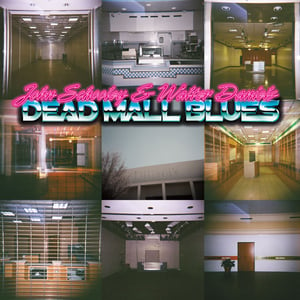$10.00 - On Sale
(IN STORES OCTOBER 7, 2014 ; MAIL ORDER SHIPMENTS START THE WEEK OF 9/22)
Walter Daniels and John Schooley have been shadowy figures in the rock n’ roll underground for a combined forty years. Daniels was mixing blues with punk rock as far back as 1992 with Austin, Texas combo Jack O’ Fire, alongside the Big Boys' Tim Kerr. Schooley’s first release as a one man band was a lo-fi cassette recording released on 45 by Goner Records in 1996. Both have been mixing blues and roots music with punk rock and noise ever since. Schooley’s first band The Revelators toured with the now-legendary Oblivians, while Daniels recorded with that same Memphis trio on the Melissa's Garage Revisited LP. Daniels has recorded and performed live with everyone from James Williamson to Eugene Chadbourne, most recently lending his harp to the OBN III’s for their latest album. Schooley toured the U.S. and Europe with the late blues great R.L. Burnside, and has racked up a long discography both as a solo artist and bandleader. Longtime friends who share a similar musical aesthetic and mindset, they have occasionally performed together and appeared on each other’s records. While it hasn't always been a fashionable or popular opinion, both have consistently championed the importance of roots in rock n’ roll. No matter how noisy or abrasive, their styles have always drawn from the deep well of American music, both black and white: country, blues and soul, gospel.
“Walter is unique; he’s really the only guy who does what he does,” says Schooley. “Most harmonica players with his degree of virtuosity would play strictly traditional blues stuff, like Little Walter and Chicago blues. And Walter can do that, too. But he can also play punk rock with the Oblivians. He can play country like Wayne Raney, or chromatic harp like Toots Thielemans, but then he can make crazy feedback noises and scream like a madman.” Daniels has equal praise for Schooley: “John Schooley is a tremendous slide player. His encyclopedic knowledge of roots music and his punk rock attitude combine for the no-nonsense, brutal music that all misanthropes need! He can sound like Link Wray, Hound Dog Taylor, or feedtime.” But despite their friendship and intertwined musical paths, the two had never recorded a full album together. The two had also never recorded exclusively with acoustic instruments. “We both play acoustically all the time,” says Schooley, “but listening to our previous records, which usually make use of a lot of distortion and feedback, you wouldn’t really know that.” Having finally gotten a decently paying job after years of working in record stores, Schooley booked some studio time with the idea to document Walter’s harmonica in an acoustic setting.
Recorded in a few hours over the course of a couple of relaxed Sunday afternoons, the resulting album Dead Mall Blues recalls some of the best white blues albums of the early 1960s. It has the laid-back grace of Backwards Sam Firk’s The True Blues and Gospel, the majesty and creepiness of John Fahey’s Blind Joe Death, the country frolic of the Holy Modal Rounders, and the drive and stomp of Koerner, Ray, and Glover. When Daniels sings a blues song like Blind Willie McTell’s “We Got to Meet Death One Day,” it sounds like a country song. Then, when pounding an old-time country standard like “Cluck Old Hen” the duo makes it sound like a blues song. Obscure selections from the American songbook by the Mississippi Sheiks, Hank Williams, and R.L. Burnside mix together to make the record a heady primer on American roots. But, like the title, there is a modern edge to the album that lends a contemporary, feel even as the music exudes a timeless quality. This isn’t just a toothless nostalgia trip ; rather than the standard images of railroad tracks and sharecropper shacks that have become cliches of blues iconography, the album cover features grainy photos of a dying mall. These images of contemporary economic desolation bring Schooley and Daniel's acoustic country blues into the 21st century, lending a modern air to the proceedings even as the oldest song on the album was written in 1843.
“There are too many bands around today who sound like their musical influences don’t date earlier than 1980.” says Schooley. “Or, who have ignored American musical traditions in favor of bland indie rock influences. I’m tired of American bands that sound like they’ve listened to more New Order than Howlin’ Wolf or Hank Williams.” 'Dead Mall Blues' is a two-man lesson in the lasting primacy of American roots traditions.
(INCLUDES DOWNLOAD CARD)
